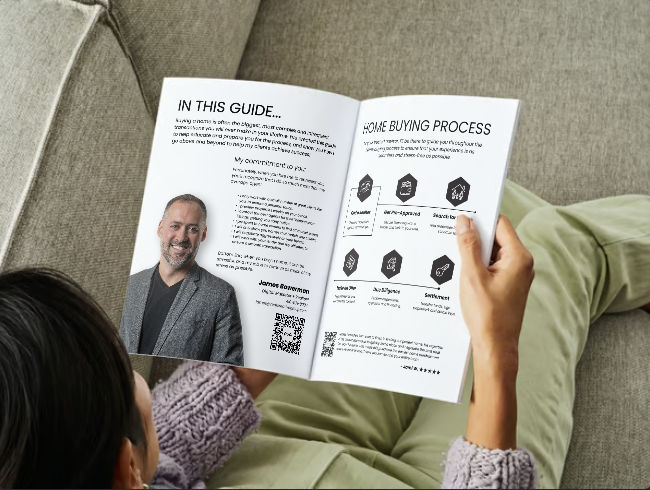Choose a Realtor
- Guide you through your home search and help find relevant inventory
- Advise you on pricing, contracts, and the transaction process
- Negotiate on your behalf, with your best interest in mind
- Communication style
- Industry knowledge
- Neighborhood expertise
- Disclosure, Confidentiality, Diligence

Home Buyers Guide
Frequently Asked Questions
What is a Buyer Representation Agreement?
A Buyer Representation Agreement is a contract between a homebuyer and a Realtor. It outlines the duties and responsibilities of both parties, ensuring that the agent works in the best interest of the buyer throughout the home-buying process.
Why do I need to sign a Buyer Representation Agreement before viewing homes?
Signing a Buyer Representation Agreement ensures that you have professional representation when viewing and purchasing homes. Due to recent changes in the MLS and legal requirements, this agreement must be in place to protect both the buyer and the agent.
How does compensation work for buyer agents?
Typically, the seller pays the commission for both the listing agent and the buyer’s agent. This means that as a buyer, you usually do not have to pay your agent directly. However, the specifics can vary, so it’s essential to discuss this with your Realtor upfront.
Can I work with other agents if I sign a Buyer Representation Agreement?
Once you sign a Buyer Representation Agreement, you are committed to working exclusively with that Realtor for the duration of the agreement. This ensures you receive consistent, focused representation.
How long does a Buyer Representation Agreement last?
The duration of the agreement is specified in the contract and can vary. It typically lasts for several months, but the exact term will be agreed upon between you and your Realtor.
What are my responsibilities under the Buyer Representation Agreement?
As a buyer, your responsibilities typically include providing accurate information to your agent, being available for home viewings, and notifying your agent of any changes in your buying criteria.
What happens if I find a home on my own?
If you find a home on your own, you should still inform your Realtor and allow them to assist you with the transaction. The agreement usually requires you to work exclusively with your agent, even if you find a property independently.
Can I negotiate the terms of the Buyer Representation Agreement?
Yes, many terms in the Buyer Representation Agreement are negotiable. You can discuss and modify aspects such as the duration of the agreement and the scope of services provided by your Realtor.
Can I work directly with the listing agent to buy a home?
While you can work directly with the listing agent, it’s important to remember that the listing agent represents the seller’s interests. This can lead to potential conflicts of interest and a lack of impartial advice. Having your own buyer’s agent ensures that your interests are prioritized and you receive expert guidance throughout the transaction.
What is a subagent in a real estate transaction?
A subagent is a cooperating agent who shows a property to a buyer but still represents the seller’s interests. If you are not represented by your own agent, the listing agent may become your subagent, providing assistance while still prioritizing the seller’s needs.
When You're Ready

Get Pre-approved
- Figure out how much cash you have for a down payment.
- Find out your credit score and whether you need to take action to remediate.
- Consider your lifestyle and how this purchase may impact your monthly budget.
- They will look at your credit, all accounts, income, and debt history to calculate what you can realistically afford.
The Costs of Homeownership
to be prepared.

- Loan Application; Credit Report ($15–30*)
- Appraisal ($400–600*)
- Home inspection ($400–800*);
- Radon inspection ($100–250*);
- Termite inspection ($50–100*);
- Well & Septic inspection ($400–800*);
- Rough estimate is about 3% of the sales price. This includes recordation taxes,
title insurance, all lender fees and settlement charges.
- Repair and Maintenance Costs
Mortgage Loan Types
3.5% down
- Typically 30 year fixed rate
- Lower credit scores
- Homeowner occupant only
- Stringent home inspection
- May take longer to close
0 % down
- Typically 30 year fixed rate
- Veterans and spouses only
- Homeowner occupant only
- Home condition requirements
- May take longer to close
Find Your Dream Home
Understanding your motivation for the move will help keep you focused on your priorities.
- Understand home types and their pros and cons (Condos vs. Co-ops vs. Fee Simple)
- Make a list of your must haves and deal breakers
- Think about the type of neighborhood you see yourself in
- Anticipate how long you want to live in this home
- Communicate with your agent about your needs
- Be flexible and open to alternatives

Make an Offer & Negotiate
- Your Realtor® will pull a list of all the homes that recently sold to give you a better idea of the market.
- Is this a “Hot Home,” is it under-priced, are there other offers? The amount of competition will determine how aggressively you want to structure your initial offer.
- Make sure you speak with your agent about all terms of the contract and to understand deadlines, liabilities and clauses that allow you to terminate the
agreement, etc.
- Decide how much you’re comfortable putting down as an act of good faith. Typically the deposit will be held in escrow by the title company and subtracted from your balance at the end of the transaction.
- Depending on the jurisdiction, the EMD commonly ranges between 1–5% of the sales price.
Structuring an Offer
An offer can have a lower price than another, but still be stronger! For example, if a seller values moving out quickly, a lower all cash offer that closes in 3 weeks might be more attractive.Your agent will know the best strategy to make a compelling offer based on market conditions, while considering your needs and comfort level.
- Once you have submitted the offer, the seller may reject, accept or counter
your offer. - Be prepared to go back and forth until you reach a suitable agreement for both parties. When all terms are agreed upon, the offer is signed by both parties and officially ratified.
- Negotiations are not necessarily over at ratification of the contract. They can
also go on during the inspection and appraisal periods.
Terms of the Offer
Price is obviously an important factor, as it will determine how much the seller nets. Work with your agent to figure out the value of the home and how much you’re comfortable spending.
Contingencies are terms that need to be met in order for the contract to go to closing. The more contingencies, the higher the risk for the seller. By waiving a contingency, you strengthen your offer. However, you may be risking your EMD, as the contract may not protect you if such contingency is not met.
Considering the length of each term is very important when submitting an offer. Every day that a house is under contract, the home is essentially “off” the market. The seller is “taking a risk,” by waiting for each term to be met.
There are certain risks that come with accepting an offer where a mortgage loan is being borrowed as opposed to a purchaser using cash with their proof of funds provided.
Amount a seller is willing to credit back to a buyer to help with closing costs. Check with your lender for maximum % of sales price; asking for credit will often weaken the offer as it lowers the seller’s net sales price.
In highly competitive situations, buyers will conduct a pre-inspection prior to submitting an offer, and waive this contingency. However, if you do request a home inspection, aim to schedule it within 7 days of ratification.
Assessment of value conducted by the lender—usually conducted within 21 days of ratification. By waiving this contingency, you may be responsible for the difference between the appraised value and sales price, if the house is assessed at a lower value.
If your offer is contingent on financing, the sooner you receive a commitment letter from the lender, the more confidence you can instill in the seller that the deal will reach closing.
Under 30 days is ideal, but some loan programs take longer to close. The closing date is important, as this is when the seller receives the funds for the transfer of the deed.
*Please note that the closing date is not necessarily the same as possession date. In some cases, sellers may want to rent back the property for a period of time. Most lenders will allow for a 60 day Maximum Rent Back Period.
Inspections & Appraisals
- Home inspections can be nerve wracking, but they are an important part of the process. There are many types of inspections depending on the location and home you are looking to purchase.
- Take the time to attend the inspection so you can have a better sense of how the home works, see which areas will require maintenance, and assess whether you will need to consider home improvements down the line. Don’t be afraid to ask questions!
- Expect to have a list of items from your inspector in a couple days. Don’t panic! Every home has a list of potential repairs, and most will be minor.
- Home inspections are another opportunity to negotiate. Speak with your agent about what items they recommend asking for repair. Focus on the items that matter the most. Keep in mind that the seller is not obligated to make all the requested repairs, unless required by a lender (FHA, HPAP, VA etc.).

- This is the assessment of value on the home by a third party appraiser. It lets the lender know how much they will be able to lend for the home.
- Negotiate to bring price down to appraised value.
- Bring more money to settlement to make up the difference.
- Walk away, but you may lose your EMD.
- Congratulations, you have instant equity! Since the buyer pays for the appraisal, there is no reason to share this with the seller. Your agent will inform the other side that the appraisal met value and your lender will proceed to finalize the loan.

Settlement
During settlement, the title attorney will go through your final settlement statement, line by line.
The title company will be in charge of disbursing the funds to the seller and the
bank (if they still owe a balance on their mortgage).
Don’t forget your government-issued ID, cashier’s check or certified funds (if amount you owe isn’t wired to the title company prior to the settlement), and personal checkbook for any small last-minute expenses.
Make sure you receive all copies of the keys.
Once you’ve signed all the documents and the deed, you can officially call yourself the homeowner!
Schedule a Consultation
Customer Reviews
Read what our awesome clients are saying!
Read what our awesome clients are saying!
Professional in every way, very knowledgeable of the current market, and great to work with. Would recommend his talent to help sell your home.
I’m extremely satisfied with the results of my collaboration with James. What sets James apart is his adept use of skills honed during his tenure at an advertising agency, which he effectively employs to showcase your home online. Through innovative techniques like video presentations, he showcased my property in such a compelling manner that it sold at a price exceeding the listing and without any physical visits, all within just two days! Without a doubt, I’ll be turning to James for any future endeavors.
James Bowerman was our realtor when we recently sold an investment property. We thought there were lots of issues but James was undaunted by the challenge. He knew who to target and how to market the property to maximize exposure and potential. He kept us informed and was very responsive throughout the process. His calm demeanor, knowledge and confidence carried us through a challenging time. We think very highly of him and would enthusiastically recommend him as a realtor for any residential or investment property.
Selling my home after residing there for 38 years was both exciting and emotional. James was so helpful in providing me with all the information I needed in order to prepare for the sale and to sell the house. He was patient with my need to have details repeated and re-explained along the way. Everything went smoothly! Thank you for a positive experience James.
We were lucky enough to be referred to James Bowerman by a friend in real estate who works outside of the area we were looking to buy in. Moving from out of state requires extra attention and James always answered all of our questions by text and email promptly and was extremely kind and gracious even when I had lotttts of questions. When the right house came along early in the process, he jumped right in and submitted our competitive offer and helped us set up all the necessary inspections & team members needed to complete the paperwork properly. We are so grateful to have met James and thank him and his team for working so closely with us throughout the process of buying a house. We are thrilled to be here!
James from the Real Creative Group gave us a top notch experience from beginning to end! He knows what it takes to sell a home and got the job done well beyond our expectations. James used clever and effective marketing strategies to get our home the attention that it deserved. He kept us well informed at all times and made our home buying AND selling experience hassle free! We had multiple offers over asking price within 1 weekend. Highly recommend James and his entire “go to team” if you are buying and especially selling a home.
Throughout our experience of selling our old home and buying the new one, James has been amazing. When he was needed, he was always there, following up immediately. I couldn’t recommend a better person for the job. Thanks James!
Our experience with James was truly exceptional. Thanks to his expert advice and impressive multi-media marketing strategy, we had multiple viewings scheduled for our first day on the market, multiple offers by that evening, and an above asking contract before night’s end. We could not have asked for more!
James is an amazing realtor. His professionalism and understanding of the real estate market were key to selling a home we had owned for 25 years and were very sentimental about. James was patient with us and always available to answer questions and help us understand the process. Thank you, James!
Our experience with James has been phenomenal. He has been there for us every step of the way, from any and all questions about selling our house, purchasing a new home, and helping find the perfect investment property. We highly recommend James for all of your real estate needs!
James was very thorough and communicative during this process. I had a specific budget and he quickly found a lot of homes, was quick to respond when I requested tours and pointed out things I didn’t know to look for such as termite damage. I highly recommend him as a realtor!
James was amazing to work with! As first time home buyers, we appreciated how patient he was in answering our questions and walking us through the home buying process. He helped us find the perfect house with everything we were looking for!
James is very professional and will ensure all your concerns are met. He talked me off the ledge several times when I was stressed about some aspect of selling and saved me from spending a lot of money on things that really weren’t necessary to get the home ready for sale. He kept me focused on the important items to make it attractive to buyers and the turn around time from listing to closing was incredibly fast and easy. I would HIGHLY recommend James and Compass for anyone looking to buy or sell.


